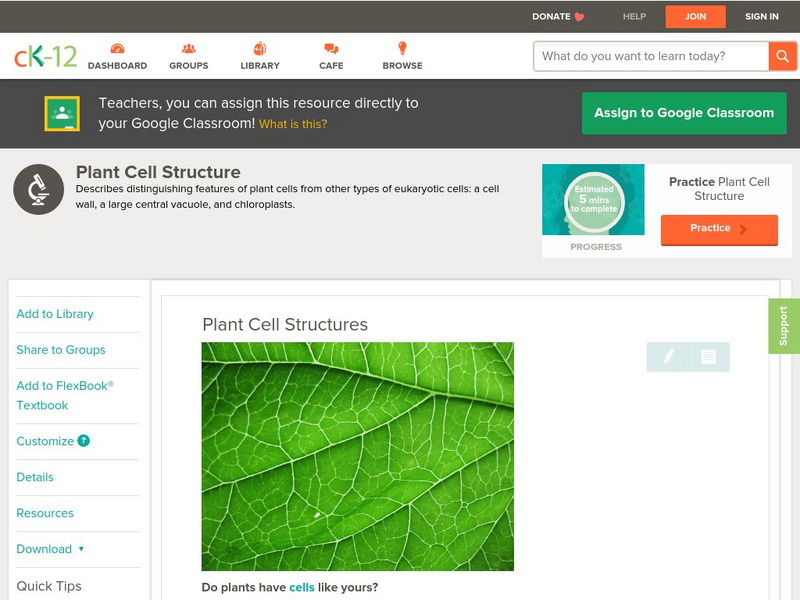Hi, what do you want to do?
Biology Junction
Plant Cell Coloring Worksheet
In this plant worksheet, pupils define each part of the plant cell. They color and label the cell drawing and then compare and contrast plant and animal cells.
Biology Junction
Cells and Their Organelles
This series of handouts and images asks young scientists to read short informational paragraphs, answer identification questions, and color and label diagrams of animal and plant cells. This is a complete resource that could be given as...
Cornell University
Plant Cell Crime Scene
Use science to solve the mystery of the Poplar murder. Pupils use forensic botany to determine if a suspect could be the killer. By analyzing images from a Transmission Electron Microscope, learners determine if the material found on the...
Gallantsbiocorner.com
Cell Organelles
Young scientists take a trip into the microscopic world of cellular biology with this practice exercise. Given pictures of different organelles, students must correctly identify specific parts of each cellular structure to demonstrate...
Curated OER
Cell Art
Combine art and science with this cell structure assignment. Learners depict a cell diagram, including the organelles, imitating a specific artist's style.
The Science Spot
Cells & Organelles
Familiarize young biologists with the inner workings of eukaryotic cells with this vocabulary worksheet. By cutting out and matching a series of definitions and memorization tips to the organelles listed in the provided...
Lincoln Public Schools
Cell Exploration Activities
Engage young biologists in exploring the mysteries of life with this collection of hands-on activities. Enlisting the help of numerous digital resources, students get an up-close look at the structure of plant and animal...
Serendip
Structure and Function of Cells, Organs and Organ Systems
Cells of different organs have unique cell functions. Learn how cell functions vary depending on their roles in the body using an inquiry-based activity. Scholars analyze the cell structure to make comparisons to its functions, allowing...
Gallantsbiocorner.com
Cell Membrane & Transport
Young scientists demonstrate their understanding of cell transport on this comprehensive worksheet. Focusing on cellular structure and the different processes that allow materials to move into, out of, and throughout animal...
Biology Junction
Cellular Structure
The human body contains more than 200 types of cells, and plants contain many other unique types of cells. While a huge variety of cells exist, they appear to have very similar structures. A detailed presentation describes the structure...
Cmassengale
Photosynthesis Diagrams Worksheet
Help young botanists get to the root of photosynthesis with this series of worksheets. By completing these diagrams, students demonstrate their understanding of the biological structures and chemical reactions that make this...
CK-12 Foundation
Ck 12: Life Science: Plant Cell Structures
[Free Registration/Login may be required to access all resource tools.] Even though plants and animals are both eukaryotes, plant cells differ in some ways from animal cells. Plant cells have a large central vacuole, are surrounded by a...
PurposeGames
Purpose Games: The Plant Cell
Take this 13 question quiz to test your knowledge of the parts of a plant cell. Know vocabulary such as nucleus, chloroplast, and ribosome.
Texas Instruments
Texas Instruments: Cell Structure/function
This StudyCards stack enables students to review information about the organelles of eukaryotic plant cell. They are tested on their ability to describe the structure, location, and function of different cell organelles.
SMART Technologies
Smart: Plant vs. Animal Cells
Students discover the similarities and differences in organelles within plant vs. animal cells with this online lesson. Start out by engaging students with a hook via Shout It Out! and use Handouts, a Workspace, Label Reveals, and a Rank...
Cells Alive
Cells Alive: Plant and Animal Cell
Investigate plant and animal cells by clicking on the different organelles to learn how their structure affects the function of the cell.




















